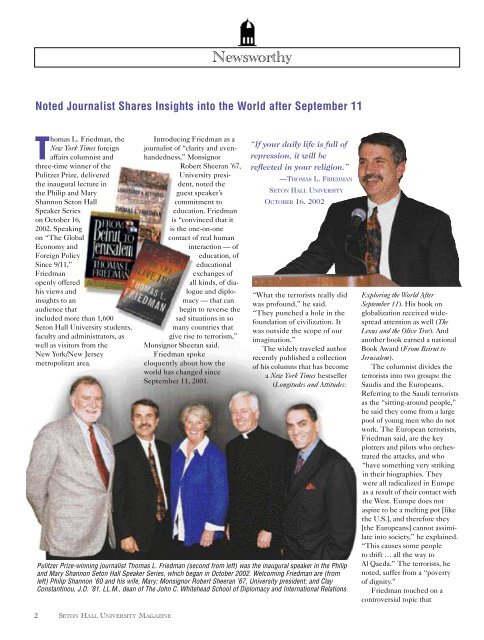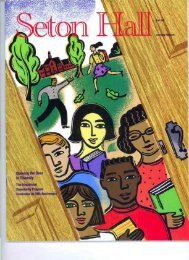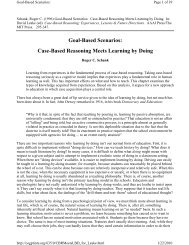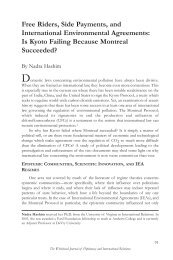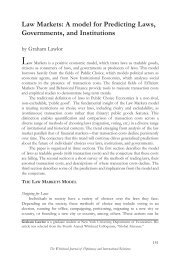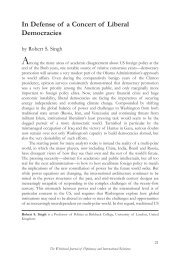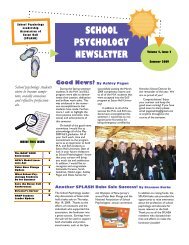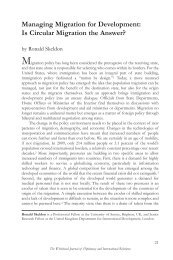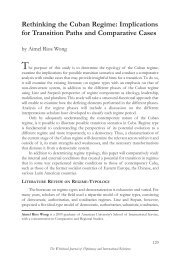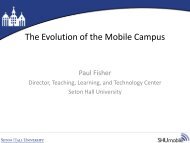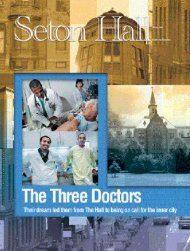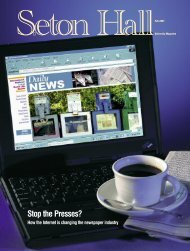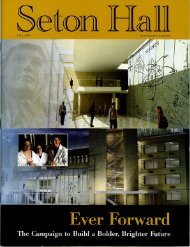Seton Hall Magazine, Winter 2003 - Seton Hall University
Seton Hall Magazine, Winter 2003 - Seton Hall University
Seton Hall Magazine, Winter 2003 - Seton Hall University
Create successful ePaper yourself
Turn your PDF publications into a flip-book with our unique Google optimized e-Paper software.
2 SETON HALL UNIVERSITY MAGAZINE<br />
Newsworthy<br />
Noted Journalist Shares Insights into the World after September 11<br />
Thomas L. Friedman, the<br />
New York Times foreign<br />
affairs columnist and<br />
three-time winner of the<br />
Pulitzer Prize, delivered<br />
the inaugural lecture in<br />
the Philip and Mary<br />
Shannon <strong>Seton</strong> <strong>Hall</strong><br />
Speaker Series<br />
on October 16,<br />
2002. Speaking<br />
on “The Global<br />
Economy and<br />
Foreign Policy<br />
Since 9/11,”<br />
Friedman<br />
openly offered<br />
his views and<br />
insights to an<br />
audience that<br />
included more than 1,600<br />
<strong>Seton</strong> <strong>Hall</strong> <strong>University</strong> students,<br />
faculty and administrators, as<br />
well as visitors from the<br />
New York/New Jersey<br />
metropolitan area.<br />
Introducing Friedman as a<br />
journalist of “clarity and evenhandedness,”<br />
Monsignor<br />
Robert Sheeran ’67,<br />
<strong>University</strong> president,<br />
noted the<br />
guest speaker’s<br />
commitment to<br />
education. Friedman<br />
is “convinced that it<br />
is the one-on-one<br />
contact of real human<br />
interaction — of<br />
education, of<br />
educational<br />
exchanges of<br />
all kinds, of dialogue<br />
and diplomacy<br />
— that can<br />
begin to reverse the<br />
sad situations in so<br />
many countries that<br />
give rise to terrorism,”<br />
Monsignor Sheeran said.<br />
Friedman spoke<br />
eloquently about how the<br />
world has changed since<br />
September 11, 2001.<br />
“If your daily life is full of<br />
repression, it will be<br />
reflected in your religion.”<br />
—THOMAS L. FRIEDMAN<br />
SETON HALL UNIVERSITY<br />
OCTOBER 16, 2002<br />
“What the terrorists really did<br />
was profound,” he said.<br />
“They punched a hole in the<br />
foundation of civilization. It<br />
was outside the scope of our<br />
imagination.”<br />
The widely traveled author<br />
recently published a collection<br />
of his columns that has become<br />
a New York Times bestseller<br />
(Longitudes and Attitudes:<br />
Pulitzer Prize-winning journalist Thomas L. Friedman (second from left) was the inaugural speaker in the Philip<br />
and Mary Shannon <strong>Seton</strong> <strong>Hall</strong> Speaker Series, which began in October 2002. Welcoming Friedman are (from<br />
left) Philip Shannon ’60 and his wife, Mary; Monsignor Robert Sheeran ’67, <strong>University</strong> president; and Clay<br />
Constantinou, J.D. ’81, LL.M., dean of The John C. Whitehead School of Diplomacy and International Relations.<br />
Exploring the World After<br />
September 11). His book on<br />
globalization received widespread<br />
attention as well (The<br />
Lexus and the Olive Tree). And<br />
another book earned a national<br />
Book Award (From Beirut to<br />
Jerusalem).<br />
The columnist divides the<br />
terrorists into two groups: the<br />
Saudis and the Europeans.<br />
Referring to the Saudi terrorists<br />
as the “sitting-around people,”<br />
he said they come from a large<br />
pool of young men who do not<br />
work. The European terrorists,<br />
Friedman said, are the key<br />
plotters and pilots who orchestrated<br />
the attacks, and who<br />
“have something very striking<br />
in their biographies. They<br />
were all radicalized in Europe<br />
as a result of their contact with<br />
the West. Europe does not<br />
aspire to be a melting pot [like<br />
the U.S.], and therefore they<br />
[the Europeans] cannot assimilate<br />
into society,” he explained.<br />
“This causes some people<br />
to drift … all the way to<br />
Al Qaeda.” The terrorists, he<br />
noted, suffer from a “poverty<br />
of dignity.”<br />
Friedman touched on a<br />
controversial topic that


